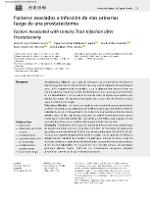Abstract
Introduction and Objective Prostate surgery is a common procedure among older men. There are different techniques, and the choice depends on the pathology to be treated, the experience of the specialist, and the technical availability. Among its complications is urinary tract infection, which causes increased morbidity and mortality and costs for the health system. The main objective of the present study was to evaluate the factors related to the onset of urinary tract infection after prostate surgery. Materials and Methods A case-control study was conducted in a population of patients undergoing prostatectomy from 2018 to early 2020 in the city of Medellín, Colombia. The cases corresponded to patients who presented urinary tract infection up to 30 days after prostatectomy. The association between cases and controls was estimated by calculating the odds ratio (OR), which was adjusted with logistic regression and a multivariate generalized additive model. Results We identified 96 incident cases of urinary tract infection after prostatectomy, with a prevalence of 8.99%. The frequency of requests for preoperative urine culture was of 52.92% (95% confidence interval [95%CI]: 48.34-57.44). The independently associated variables were: request for preoperative urine culture, number of doses, and type of antibiotic used for prophylaxis. In particular, the use of aminoglycosides in prophylaxis schemes was found to be a protective factor. The main germs isolated were: Eschirichia coli, Pseudomonas aeruginosa, Klepsiella pneumoniae, Enterococos faecalis, and Serratia marcescens. Conclusion The present study shows that factors such as the preoperative request for urine culture and the use of aminoglycosides for surgical prophylaxis influence the probability of developing urinary tract infection after prostatectomy. © 2022. Sociedad Colombiana de Urología. All rights reserved.














